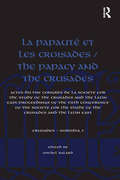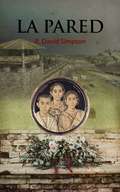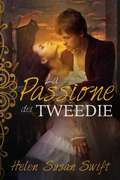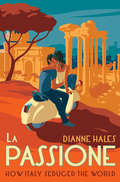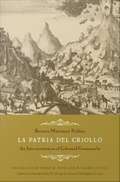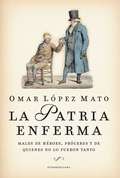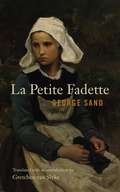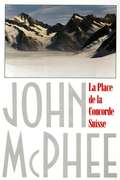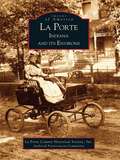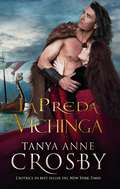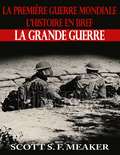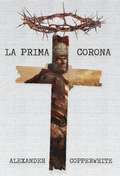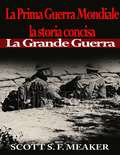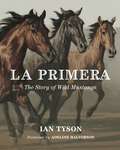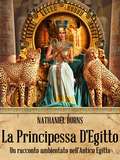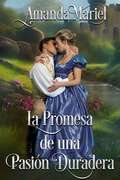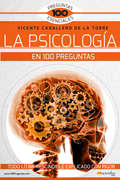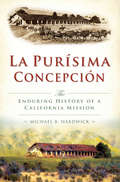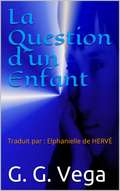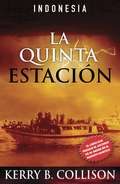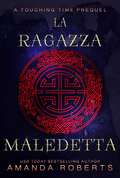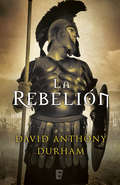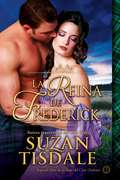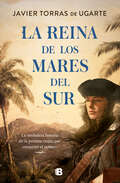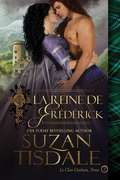- Table View
- List View
La Papauté et les croisades / The Papacy and the Crusades: Actes du VIIe Congrès de la Society for the Study of the Crusades and the Latin East/ Proceedings of the VIIth Conference of the Society for the Study of the Crusades and the Latin East (Crusades - Subsidia)
by Michel BalardThis volume brings together a selection of the papers on the theme of the Papacy and the Crusades, delivered at the 7th Congress of the Society for the Study of the Crusades and the Latin East. After the introduction by Michel Balard, the first papers examine aspects of crusader terminology. The next section deals with events and perceptions in the West, including papers on the crusades against the Albigensians and Frederick II, and on the situation in the Iberian peninsula. There follow studies on relations between crusaders and the local populations in the Byzantine world after 1204 and Frankish Greece, and in Cilician Armenia, while a final pair looks at papal interventions in Poland and Scandinavia.
La Pared (1 #1)
by R. David SimpsonEs el año 410 dC y las órdenes de Roma son evacuar a todos los soldados y sus familias del Muro de Adriano de Inglaterra y regresar para ayudar a defender Roma. Dos adolescentes; Cassia, la hija del Comandante y Felix, el hijo de un soldado común junto con su madre.,debe aprender las duras lecciones de vida, como luchan por sobrevivir, mientras se mudan de Britannia a la Galia a Italia.
La Passione dei Tweedie
by Helen Susan Swift Ilaria FortunaNel tardo XVI secolo, la Scozia è divisa dalla guerra. Jeannie Tweedie di Letham Valley è fidanzata con Robert Ferguson, un uomo che nessuno reputa degno di lei. Quando Jeannie viene rapita dal misterioso Yorling, sia lei che Robert si trovano costretti a decidere quale sia il loro futuro...e con chi. All'avventura nei luoghi simbolo dei confini scozzesi, Jeannie si trova combattuta tra due uomini. Ma quale sarà il suo prescelto, e riuscirà a scoprire la sua Passione dei Tweedie?
La Passione: How Italy Seduced the World
by Dianne HalesFrom the New York Times bestselling author knighted by the President of Italy for her writing, a jubilant exploration of how Italy transformed the Western world's most vibrant passions -- from literature to art, music to movies. No country has matched Italy’s impact on culture. Just think of painting without Leonardo, opera without Verdi, fashion without Armani, food without the signature tastes of pasta, gelato, and pizza. The first universities, first banks, first public libraries? All Italian. Dianne Hales attributes these landmark achievements to la passione italiana, a primal force that stems from an insatiable hunger to discover and create; to love and live with every fiber of one's being. This fierce drive, millennia in the making, blazes to life in the Sistine Chapel, surges through a Puccini aria, deepens a vintage Brunello, and rumbles in a gleaming Ferrari engine.Our ideal tour guide, Hales sweeps readers along on her adventurous quest for the secrets of la passione. She swims in the playgrounds of mythic gods, shadows artisanal makers of chocolate and cheese, joins in Sicily’s Holy Week traditions, celebrates a neighborhood Carnevale in Venice, and explores pagan temples, vineyards, silk mills, movie sets, crafts studios, and fashion salons. She introduces us, through sumptuous prose, to unforgettable Italians, historical and contemporary, all brimming with the greatest of Italian passions—for life itself.A lyrical portrait of a spirit as well as a nation, La Passione appeals to the Italian in all our souls, inspiring us to be as daring as Italy’s gladiators, as eloquent as its poets, as alluring as its beauties, and as irresistible as its lovers.
La Patria Del Criollo: An Interpretation of Colonial Guatemala
by Severo Martínez PeláezThis translation of Severo Martnez Pelez's La Patria del Criollo, first published in Guatemala in 1970, makes a classic, controversial work of Latin American history available to English-language readers. Martnez Pelez was one of Guatemala's foremost historians and a political activist committed to revolutionary social change. La Patria del Criollo is his scathing assessment of Guatemala's colonial legacy. Martnez Pelez argues that Guatemala remains a colonial society because the conditions that arose centuries ago when imperial Spain held sway have endured. He maintains that economic circumstances that assure prosperity for a few and deprivation for the majority were altered neither by independence in 1821 nor by liberal reform following 1871. The few in question are an elite group of criollos, people of Spanish descent born in Guatemala; the majority are predominantly Maya Indians, whose impoverishment is shared by many mixed-race Guatemalans. Martnez Pelez asserts that "the coffee dictatorships were the full and radical realization of criollo notions of the patria. " This patria, or homeland, was one that criollos had wrested from Spaniards in the name of independence and taken control of based on claims of liberal reform. He contends that since labor is needed to make land productive, the exploitation of labor, particularly Indian labor, was a necessary complement to criollo appropriation. His depiction of colonial reality is bleak, and his portrayal of Spanish and criollo behavior toward Indians unrelenting in its emphasis on cruelty and oppression. Martnez Pelez felt that the grim past he documented surfaces each day in an equally grim present, and that confronting the past is a necessary step in any effort to improve Guatemala's woes. An extensive introduction situates La Patria del Criollo in historical context and relates it to contemporary issues and debates.
La Patria enferma: Males de héroes, próceres y de quienes no lo fueron tanto
by Omar López MatoLa historia de enfermos, enfermedades y médicos desde la Conquista hasta1906. Males de héroes, próceres y de quienes no lo fueron tanto. La historia de los hombres es inseparable de la enfermedad, el dolor ylos trastornos psiquiátricos. Sin embargo, la historiografía clásica-con excepción de los estudios pioneros del doctor José María RamosMejía- suele evitar, en la vida de los próceres, cualquier referencia asu salud que los aleje del bronce y los acerque a su dimensión desimples mortales. En estas páginas Omar López Mato se propone humanizara estos personajes, dando cuenta de las dolencias que padecieron y quedeterminaron sus conductas, más allá del contexto social y político.Con estilo ágil y ameno, el autor repasa la historia de enfermos,enfermedades y médicos desde la Conquista hasta 1906, año en quemurieron cuatro importantes referentes: Bartolomé Mitre, ManuelQuintana, Bernardo de Irigoyen y Carlos Pellegrini. Desde MarianoMoreno, muerto a bordo de un barco a causa de una sospechosaintoxicación, hasta Manuel Belgrano, sifilítico, víctima del paludismo yfinalmente vencido por la cirrosis, el autor recorre las adversidadesque tuvieron que afrontar José de San Martín, Juan Manuel de Rosas, JuanBautista Alberdi, Nicolás Avellaneda y Domingo Faustino Sarmiento, entreotros. Una obra reveladora que nos muestra un costado oculto, peroineludible, de nuestro pasado.
La Petite Fadette: Opéra-comique En 3 Actes (classic Reprint)
by George SandSet in the French countryside of George Sand’s childhood and narrated in the unique voice of a Berrichon peasant, La Petite Fadette is a beloved 1848 novel about identical twin brothers and Fadette, the mysterious waif with whom they both fall in love. The brothers, Landry and Sylvinet, belong to a highly respected farm family. When young Landry meets Fadette, whose very name suggests that she is a witch, he is captivated by the girl despite her lowly status and disreputable family. Sylvinet soon follows suit. Fadette’s relationship with the twins defies the patriarchal norms of French society as well as the expectations of the village, resulting in a tale of love, courage, and clever strategy winning out over superstition and prejudice.Often regarded as a simple country tale, Sand’s novel is layered with meaning, including subtle nods to the burgeoning desire for political and sexual equality in nineteenth-century France. This thoughtful critical translation by Gretchen van Slyke brings the complexity of the original story to life. Her introduction explores the autobiographical and political dimensions of the novel, and her translation preserves the rustic charm and archaic flavor of Sand’s language.An invaluable contribution to French literary studies and nineteenth-century literature studies, this new edition ensures that La Petite Fadette will be read by generations to come.
La Place De La Concorde Suisse
by John McpheeJohn McPhee embeds himself in a "Section de Renseignements" (military intelligence) of the Swiss Army. This army is more like what we in the U.S. would call the National Guard. Every male Swiss serves in the army for 30 years, but except for an annual 3-week refresher course, lives a normal life (although subject to mobilization within 48 hours at need). McPhee's talent for interviewing his subjects, salting his narrative with history, geography, and even geology, makes this a very informative as well as entertaining book. NOTE: There are a considerable number of French (and some German) words and phrases in this book While it isn't necessary to know French to understand those words and phrases, some knowledge of French would not hurt,
La Porte, Indiana and Its Environs
by Archival Preservation Committee La Porte County Historical Society, IncOriginally part of the Pottawatomie Nation, the northern Indiana area of La Porte, which is French for "The Door," was named for the access it provided settlers who passed westward into the Calumet River valley. Now known as "The Maple City" for its many beautiful and colorful trees, La Porte boasts a rich and varied history. From its beginnings in 1833 when the city's founding fathers donated the land for the public square, through the 1930s and beyond, La Porte has been central to the area's business, agricultural, religious, and architectural development.The diverse and rich history of the La Porte area is captured in this remarkable collection of over 200 vintage photographs. La Porte, Indiana and Its Environs depicts the history of the area from the Pioneer Period through the 1930s. It chronicles the changes and challenges faced as the log cabins of the Pioneer Days became the elaborate homes of the early 20th century, as businesses evolved to meet the changes of industrialization, and as one-room school houses were replaced to meet the needs of the growing community.
La Preda Vichinga
by Tanya Anne Crosby Elisabetta BriccaElienor sapeva che gli Uomini del Nord si sarebbero riversati come una tempesta sul castello di Brouillard. Nei suoi sogni, ha visto la morte di molti, ma non la sua. E ha visto lui, il Vichingo dai capelli d'oro, fare di lei la sua preda... Alarik ha giurato vendetta al conte francese, ma tutto ciò che trova nel castello è una bellezza dai capelli scuri e dagli occhi viola. Affascinato dagli strani sogni e dallo spirito fiero della ragazza, riesce a stento a controllare la bruciante passione che lei gli suscita, nell'anima e nel corpo, ma in una terra piena di conflitti, rischierà tutto ciò che ha per amare la donna i cui sogni mettono a repentaglio il loro futuro.
La Première Guerre mondiale: l’Histoire en bref – La Grande Guerre
by Hanène Baatout Scott S. F. MeakerLa Première Guerre mondiale : l'Histoire en bref - La Grande Guerre La Première Guerre mondiale était censée être la dernière de toutes les guerres, d'où son nom de Grande Guerre. La Grande Guerre a pris un mauvais départ selon les Allemands. Le plan était de repousser la France et la Russie tout en se concentrant sur l'objectif principal, en aidant l'Autriche-Hongrie à s'entretenir avec la Serbie. Les pertes en vie humaine, pendant la Grande Guerre, était immense.
La Prima Corona
by Valeria Bragante Alexander CopperwhiteNell’anno 66 d.C., Giuda di Galilea guidò una rivolta contro i Romani e reclamò per sé il regno di Giudea. Fu allora che decise di inviare un uomo di sua fiducia a cercare la reliquia con cui sarebbe stato incornato re: La Prima Corona. Il giovane Daniel si troverà di fronte ai propri valori e scoprirà una verità occulta tra i misteri e le leggende: La Vera Storia di Cristo. Dalla profondità dei vicoli di Roma, fino ai luoghi più reconditi della Giudea, l’avventura di scoprire la provenienza ed il potere della reliquia desiderata cambierà la sua maniera di vedere le cose e gli farà capire che siamo tutti partecipi della storia … in un modo o nell’altro.
La Prima Guerra Mondiale: la storia concisa - La Grande Guerra
by Simona Leggero Scott S. F. MeakerLa Prima Guerra Mondiale doveva essere la guerra che terminava tutte le guerre, da qui il nome la Grande Guerra. La Grande Guerra ebbe un brutto inizio dalla prospettiva della Germania. Il piano era di allontanare la Francia e la Russia mentre lo scopo principale, era aiutare l'Impero austro-ungarico contro la Serbia. La perdita di vita nella Grande Guerra fu immensa.
La Primera: The Story of Wild Mustangs
by Ian TysonIan Tyson's classic song, beautifully illustrated for horse-loving youngsters everywhereThe story of the wild mustang in North America is the subject of “La Primera,” a song written and performed by Canadian folk singer and horse afficionado, Ian Tyson. And it is the subject of this handsome picture book with paintings by equine artist Adeline Halvorson. In 1493, the first Spanish horses were loaded onto a ship and taken on a long, hard voyage to the Americas. Many died along the way and only a few survived. Among them was La Primera. Little by little, their numbers grew, and in time they were in Mexico with Cortez and his conquistadors, on the grasslands with the Comanche upon their backs, and in frontier towns serving the needs of cowboys. The rugged wild mustangs still exist, and their bloodlines are traceable all the way back to those first horses and the careful records the Spaniards kept. That the animals have survived for five hundred years, while the world around them changed, is a tribute to their endurance and fiery spirit. Included with the story of the song is a section of historical facts on these amazing and beautiful animals and a CD of Ian Tyson singing “La Primera.”
La Principessa D'Egitto
by Nathaniel Burns Laura MicheliniNathaniel Burns tesse un inquietante racconto che parla di antichi misteri nell'Egitto Antico, che si rivelano attraverso un cast di personaggi nei quali il lettore moderno si riconoscerà anche se sono trascorsi millenni. La reputazione di Neti-Kerty come primo imbalsamatore donna d'Egitto sembra aver raggiunto addirittura le orecchie del faraone. Neti e Shabaka, investigatore speciale e prefetto di Tebe, sono stupiti della loro convocazione al palazzo di Ramesse II, ritrovandosi ad indagare sulla morte improvvisa del visir Khay. Grazie alle proprie capacità di deduzione e alla conoscenza dei morti, Neti intuisce ben presto che qualcosa non torna. Mentre sempre più persone scompaiono durante l'inchiesta, la situazione sembra sfuggire di mano e in poco tempo Shabaka e Neti si ritrovano a scrutare nei più profondi recessi dell'animo umano... La Principessa d'Egitto ci riporta indietro, in una terra ricca di dei, faraoni, rituali e magia. Dipinge per il lettore un quadro dettagliato dell'Egitto faraonico in tutta la sua gloria e in tutte le sue ombre. Ricreando fedelmente una delle epoche più famose della storia d'Egitto, l'autore best-seller Nathaniel Burns tesse un'inquietante e raccapricciante trama di antichi misteri egizi, con un cast di personaggi nei quali il lettore moderno si riconoscerà, anche se sono passati millenni. Dunque, accendete un bastoncino di incenso, sedetevi accanto ad una luce e alzate il sipario sull'ombroso passato, con questo avvincente racconto di amore e intrighi tra vivi e morti, ambientato all'epoca di una delle civiltà più affascinanti della storia.
La Promesa de una Pasión Duradera: Romance en un Castillo de Regencia (Un Romance de Castillo #1)
by Amanda MarielDescripción del libro: En las inquietantes ruinas del Castillo de Almerry, marcado por la guerra y los sombríos secretos, un encuentro casual entre una mujer atrevida y un soldado cansado de la guerra enciende una pasión que desafía las heridas de la guerra en Una Promesade de Pasión Duradera, una historia de Regencia sobre la resistencia duradera del amor. En la encantadora secuela de Susurros de Deseo, viaje de regreso a tiempos de elegantes romances de Regencia, como se muestra en La Promesa de una Pasión Duradera. Entre las inquietantes ruinas del Castillo de Almerry, un reflejo de luz guía los pasos de Rebecca Summerville. Llevada por la curiosidad y un espíritu indomable, tropieza con un tesoro inesperado- un encuentro casual con el Capitán Camden Beauchamp. Un soldado marcado por las pruebas de Waterloo. Camden busca consuelo entre los muros de del castillo, y se encuentra con la intromisión atrevida de Rebecca. Perseguida por el espectro por la trágica pérdida de su hermano en batalla, Rebecca desarrolla una profunda aversión a todo lo militar. Sin embargo, mientras el destino va tejiendo sus hilos, su atrevido desafío y su corazón compasivo, encienden en Camden una chispa de deseo, que él nunca creyó posible. Decidido a salvar el abismo que había entre sus almas cansadas por las guerras, Camden anhela reclamar su afecto, mientras Rebecca resguarda su corazón, atemorizada por otra abrumadora pérdida. Unidos por los ecos del legado del amor duradero, ¿podrán dos almas marcadas por los estragos de la guerra, encontrar el valor para reparar los severos daños causados por el pasado? Mientras sus mundos chocan con los antiguos muros del castillo, ellos deben navegar por un paisaje de tierno anhelo y secretos no dichos. En La Promesa de Pasión Duradera, el deseo y la resistencia se entrelazan, probando que incluso en medio de los restos de la historia, la luz del amor puede guiarlos a través de la os
La Psicología en 100 preguntas (100 Preguntas esenciales)
by Vicente Caballero de la TorreLas respuestas de la Psicología a temas tan relevantes como los límites de la percepción humana, la falsedad de los recuerdos biográficos, la medición de la inteligencia o la conducta patológica, suscitan un gran interés entre los lectores que quieren conocerse mejor a sí mismos y a los demás. Descubra que las raíces de la Psicología son profundas, que se remontan a los mitos clásicos y a los médicos de la Antigua Grecia y que dejaron brotar a la Psicología con fuerza en un siglo tan importante para la historia como el XIX (el siglo que lo cambió absolutamente todo). Descubra qué tipo de personalidad psíquica se corresponde con su forma de ser y cómo su cuerpo delata lo que piensa y siente realmente aunque se esfuerce en fingir otra cosa. Sepa por qué no consigue olvidar o recordar según qué cosas y averigüe si podemos cambiar para mejor como personas o si más bien tenemos que aceptarnos tal y como somos… Todo esto entre otros muchos asuntos de su interés. Una obra para lectores que no se conforman con haberse hecho alguna vez una pregunta especial sino que ansían obtener la respuesta.
La Purisíma Concepción: The Enduring History of a California Mission (Brief History)
by Michael R. HardwickIn two centuries, La Purísima Concepción went from a fledgling frontier mission to a renowned California State Historic Park. Once home to many Spanish soldiers, settlers and hundreds of Chumash Indians, La Purísima held the seat of the California Mission government under Father Mariano Payeras. It withstood catastrophic events, including widespread disease in early years and a great Southern California earthquake in 1812. Emerging from ruins for the last time in 1934, after restoration by the Civilian Conservation Corps, structures appear today as they did in the early nineteenth century. The uniquely restored California Mission complex operates as a state park in a pastoral setting. Author and archivist Michael R. Hardwick chronicles the story of La Purísima and the resilient people and culture that made a lasting influence.
La Question D'un Enfant
by Guido Galeano Vega Elphanielle HervéUn livre, la suite de La Réponse d'un Ancien, qui parle du délicat sujet du péché, du point de vue d'un homme de foi et croyant en les Écritures Saintes. L'enfant de l'histoire La Réponse D'un Ancien, Bruno, consulte à nouveau l'ancien à propos du sujet délicat qu'est le péché, si commun, mentionné tant de fois, mais sans informations claires ou compréhensibles pour les enfants et la majorité des gens. L'ancien, parle, avec patience, de ce thème avec l'enfant, de manière à ce que le lecteur ait une explication satisfaisante du concept du péché selon la Bible Christocentrique.
La Quinta Estación
by Kerry B. CollisonA raíz del colapso económico de Indonesia, las mujeres chinas son el objetivo de las Fuerzas Espciales imprudentes y brutales del yerno del Presidente. En un ambiente islámico en evolución, el sentimiento anti-chino lleva al país al borde del colapso, a medida que el interés internacional se ve reforzado por los relatos de periodistas protagonistas, sobre historias reales de supervivencia.
La Ragazza Maledetta
by Amanda RobertsTutto ad un tratto, la sua vita non le apparteneva più.... Nelle strade di Pechino, Sparrow si guadagna da vivere rubando portafogli e cibarie dalle bancarelle, fino a quando un giorno tocca un oggetto che la trascina nel tempo, risvegliando in lei un potere che non riesce a capire e nemmeno a controllare. Sparrow viene forzata ad usare il suo "dono" per leggere il futuro, uno sforzo che potrebbe esserle perfino fatale. I giorni si tramutano in incubi mentre Sparrow è terrorizzata dal non poterne più uscire. Non perderti "La ragazza maledetta" il prologo della trilogia Touching Time.
La Rebelión
by David Anthony DurhamEl nuevo libro del autor del best seller El orgullo de Cartago. Una novela soberbia sobre Espartaco, el legendario gladiador, y la revuelta de esclavos que encabezó y a punto estuvo de someter a Roma y sus invencibles legiones. En esta emocionante novela histórica somos testigos de la rebelión más famosa de la historia desde diversos, y a veces opuestos, puntos de vista, entre ellos el del propio Espartaco, el visionario cautivo y gladiador cuya constancia y carisma convierten la fuga de una prisión en una rebelión multicultural que amenaza a un imperio; el de la profética Astera, cuyo contacto con el mundo de los espíritus y sus augurios guía el desarrollo de la rebelión; el de Nonus, un soldado romano que se mueve a ambos lados del conflicto en un intento, en parte desesperado, de salvar la vida; el de Laelia y Hustus, dos niños pastores incorporados a las tropas de la rebelión de los esclavos, y el de Kaleb, el esclavo al servicio de Craso, el senador romano y comandante que carga con la poco envidiable tarea de aplastar una insurrección de meros esclavos, todo ello en un entorno de violencia, heroísmo y traición. Lo que está en juego con la rebelión de Espartaco es nada menos que el futuro del mundo antiguo. Nadie aporta más brío, inteligencia y frescura a la novela sobre la época clásica que David Anthony Durham. Críticas:«David Anthony Durham es un tipo de talento enorme. Estoy impaciente por leer su próxima novela, sea la que sea.»George R.R. Martin «Durham capta el frenesí de las guerras de la antigüedad de manera extraordinariamente realista... Una novela espléndida, hábilmente estructurada.»The New York Times «Fascinante... Aprovecha con inteligencia lo que se sabe acerca de este periodo remoto... El autor ha especulado e inventado de manera inmejorable.»The Washington Post «Durham entreteje abundantes detalles psicológicos, militares y políticos para crear este vívido relato sobre uno de los periodos más novelados de la historia.»Publisher Weekly
La Reina de Frederick
by Eva Luz Carmona Pichardo Suzan TisdaleNo puede haber luz sin oscuridad, ni esperanza sin desesperación, ni amor sin corazones rotos. Algunas cicatrices no pueden verse. Cuando el apuesto Frederick Mackintosh pide la mano de Aggie McLaren en matrimonio, ella está segura que es avaricia o locura lo que lo motiva. Ademas de tierras y una oportunidad de ser jefe, ella cree que no tiene nada mas que ofrecer. Pronto descubre que no puede haber nada mas alejado de la verdad. La esperanza que ella creía haber perdido muchos años atrás, vuelve a florecer con la amabilidad de su esposo, su honor y su fiera determinación para lograr que su matrimonio y que su clan sean un éxito. Algunas veces, la perfección es imperfecta, Aggie McLaren no es la esposa perfecta que Frederick Mackintosh. Ella no es estudiosa, ni vivaz, ni voluptuosa. Pequeña, tímida e incapaz de hablar, es su sonrisa y la oportunidad de ser jefe de su propio clan lo que lo impulsa a pedir su mano en matrimonio. Frederick hará todo lo que tenga que hacer para volverla a ver sonreír y para ayudarla a encontrar su propia voz.
La Reina de los Mares del Sur
by Javier Torras de UgarteVuelve Javier Torras de Ugarte con la fascinante historia de otra gran mujer, la primera almirante española que conquistó el océano en una aventura hacia los mares del sur. Esta es la otra historia de la gran aventura española.Hace más de quinientos años, en 1519, la escasez de víveres y las enfermedades asolaban España mientras Magallanes comenzaba los viajes que serían el punto de partida para el apogeo y el dominio español del mar del Sur. Esta es la otra historia de una gran conquista.Años después, cuando la carrera por la conquista de lo desconocido llegó a su punto álgido, el navegante Álvaro de Mendaña murió durante el trayecto dejando su tripulación sin general. Será entonces cuando su esposa Isabel Barreto, decide ponerse al mando y reconquistar los parajes que su esposo había descubierto en vida. Desde Pontevedra hasta los mares del Sur, Isabel se enfrentó a viento, marea y los prejuicios de laépoca, pero nada pudo frenar la ambición por escribir su propio futuro. La verdadera historia de la primera mujer que conquistó el océano. Con su inigualable capacidad para convertir la historia en una aventura, en esta novela Javier Torras de Ugarte nos cuenta la vida real de la primera mujer que ostentó el título de almirante y adelantada del mar Océano, así como de general de la expedición naval y gobernadora de los lugares fundados bajo su dominio. Pero más allá de cualquier título, este es el relato de una extraordinaria mujer que, para convertirse en la Reina de los Mares del Sur, primero tuvo que hacerse dueña de su destino. Reseñas del libro anterior del autor, La dama púrpura: «Este libro combina el rigor de Santiago Posteguillo con las intrigas de Juego de tronos».Luis Zueco «Una novela histórica llena de aventuras e intrigas, donde se eleva el perfil de una gran protagonista de la historia prácticamente olvidada».20 minutos
La Reine de Frédérick
by Angélique Olivia Moreau Suzan TisdaleIl ne peut y avoir de lumière sans obscurité, d'espoir sans détresse, d'amour sans souffrance. Certaines cicatrices sont invisibles. Quand le séduisant Frédérick Mackintosh propose à Aggie McLaren de l’épouser, elle est certaine que c'est par cupidité ou par folie. À part ses terres et l'opportunité pour lui de devenir chef, elle pense qu'elle n'a rien à offrir. Elle comprend vite que rien ne saurait être plus éloigné de la vérité et l'espoir qu'elle croyait perdu depuis longtemps renaît grâce à la bienveillance de son époux, à son sens de l’honneur et à sa détermination féroce à assurer la pérennité de leur mariage et de leur clan. Parfois, la perfection est imparfaite. N'étant ni érudite, ni vive, ni voluptueuse, Aggie McLaren ne ressemble en rien à la femme parfaite dont avait rêvé Frédérick Mackintosh. Petite, timide et incapable de parler, c'est pourtant par un léger sourire et la promesse de lui offrir un jour la tête de son clan qu'elle le convainc de lui demander sa main. Frédérick fera tout ce qui est en son pouvoir pour la revoir sourire et l'aider à se faire entendre.
